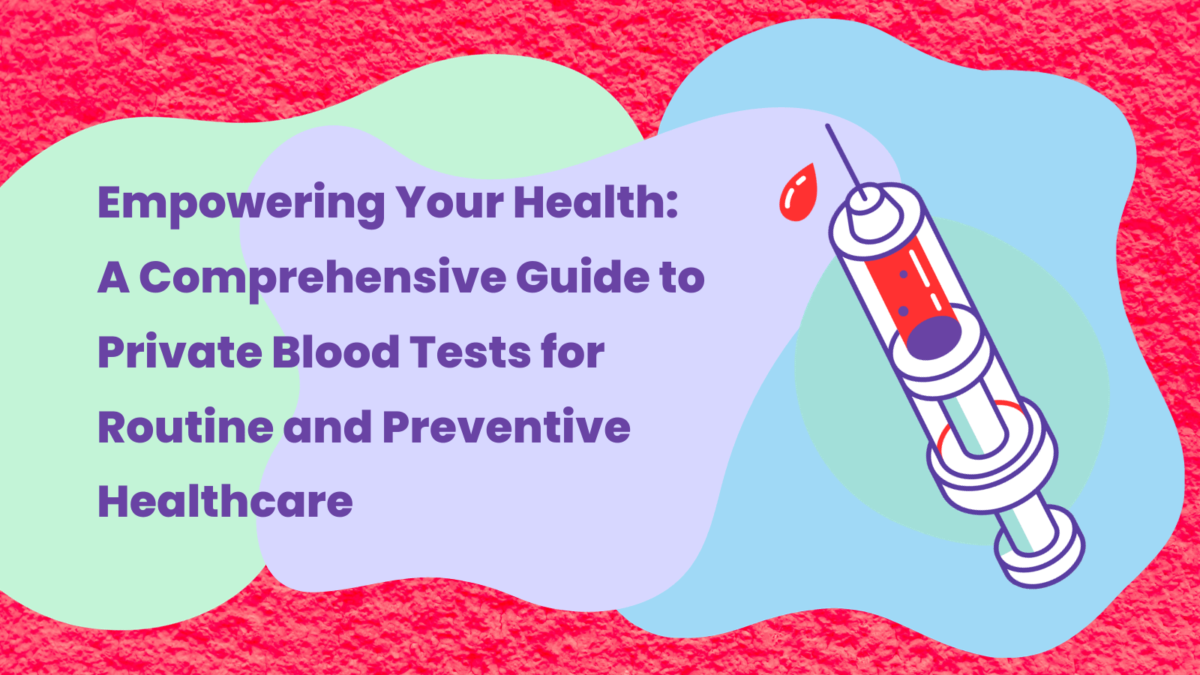Introduction:
In today’s fast-paced world, where people face many health challenges, personalized healthcare is gaining popularity, and private blood tests have emerged as a valuable tool for individuals who want to take a proactive approach to their well-being. These tests are more advanced than traditional check-ups and provide a deeper insight into one’s health status. By analyzing blood samples, they can detect potential risks and identify health issues at an early stage, enabling timely intervention.
Private blood tests come in many types, each designed to examine different aspects of health. For instance, some tests focus on specific diseases, such as cancer or heart disease, while others test for vitamin and mineral deficiencies, hormone imbalances, or food intolerances. The results of these tests can help individuals make informed decisions about their diet, lifestyle, and medical care.
One of the benefits of private blood tests is that they allow individuals to take control of their health, empowering them to make proactive choices that can prevent future health problems. By identifying potential risks early on, individuals can make more informed decisions about their health and take steps to prevent or delay the onset of chronic conditions.
Private blood tests are an essential component of routine and preventive healthcare. They provide individuals with a more in-depth understanding of their health status and can help identify potential risks and health issues before they become more severe. By taking advantage of these tests, individuals can take control of their health and develop a more informed and empowered approach to health management.
I. Understanding Private Blood Tests:
A. Definition and Purpose:
Private blood tests involve the analysis of blood samples in a private laboratory setting. The primary purpose is to assess various health markers, providing a detailed overview of an individual’s physiological status.
B. Key Components:
- Complete Blood Count (CBC): Evaluates red and white blood cell counts, hemoglobin levels, and platelet count, offering insights into the overall health and potential issues such as anaemia or infection.
- Lipid Profile: Measures cholesterol levels, triglycerides, and other lipid components, aiding in the assessment of cardiovascular health and the risk of heart diseases.
- Liver Function Tests (LFTs): Assess the health of the liver by measuring enzyme levels and other markers, helping detect conditions like hepatitis or liver disease.
- Kidney Function Tests (KFTs): Examine markers such as creatinine and blood urea nitrogen (BUN) to evaluate kidney function and detect early signs of renal dysfunction.
- Blood Glucose Levels: Essential for monitoring diabetes and assessing insulin sensitivity.
II. Benefits of Private Blood Tests:
A. Early Detection of Health Issues:
- Preventive Health Screening: Identifying potential health risks before symptoms manifest allows for proactive intervention, potentially preventing the progression of diseases.
- Cancer Markers: Some private blood tests can detect markers associated with various cancers, facilitating early diagnosis and improving treatment outcomes.
B. Personalized Health Insights:
- Tailored Health Plans: Results from private blood tests enable healthcare professionals to create personalized health plans, considering individual risk factors and lifestyle.
- Nutritional Guidance: Nutrient levels, such as vitamin D and iron, can be assessed, guiding individuals toward targeted dietary adjustments or supplementation.
C. Convenience and Accessibility:
- Prompt Results: Private blood tests often provide faster results compared to traditional healthcare settings, allowing for swift action and decision-making.
- Accessibility: Individuals can opt for private blood tests without the need for a doctor’s referral, promoting a more proactive approach to health management.
III. Types of Private Blood Tests:
A. General Wellness Panels: Comprehensive assessments covering CBC, lipid profile, liver and kidney function tests.
B. Hormone Testing: Evaluating hormone levels to assess reproductive health, thyroid function, and adrenal health.
C. Genetic Testing: Identifying genetic predispositions to certain conditions, enabling personalized preventive measures.
D. Inflammatory Markers: Assessing markers like C-reactive protein (CRP) to identify inflammation in the body, which can be indicative of various health issues.
IV. Integrating Private Blood Tests into Routine Healthcare:
A. Frequency: While routine check-ups are recommended, the frequency of private blood tests may vary based on age, gender, family history, and individual health goals.
B. Consultation with Healthcare Professionals: Interpreting private blood test results should be done in consultation with healthcare professionals, ensuring accurate analysis and appropriate follow-up actions.
V. Conclusion:
Private blood tests are a powerful tool that can provide individuals with a comprehensive and personalized snapshot of their physiological health. These tests can offer a detailed analysis of various biomarkers, such as blood sugar levels, cholesterol levels, hormone levels, and other critical indicators of overall health. By analyzing these biomarkers, private blood tests can detect potential health issues early on, allowing individuals to take proactive steps to manage their health before problems escalate.
One of the key benefits of private blood tests is that they enable people to take a more personalized approach to their health planning. Rather than relying on generalized health advice, individuals can tailor their health and wellness strategies to their unique needs and goals. For example, if a private blood test reveals that an individual has high blood sugar levels, they can adjust their diet and exercise routine accordingly to help manage their blood sugar levels and prevent the development of diabetes.
Another significant benefit of private blood tests is that they can contribute to overall well-being. By providing people with a deeper understanding of their health status, these tests can help them feel more in control of their health and less anxious about potential health risks. This sense of empowerment can lead to improved mental health and greater overall well-being.
Incorporating private blood tests into regular healthcare practices can be a game-changer for many individuals. Through proactive monitoring and personalized health planning, these tests can help people stay ahead of potential health issues and lead a healthier and more fulfilling life.
